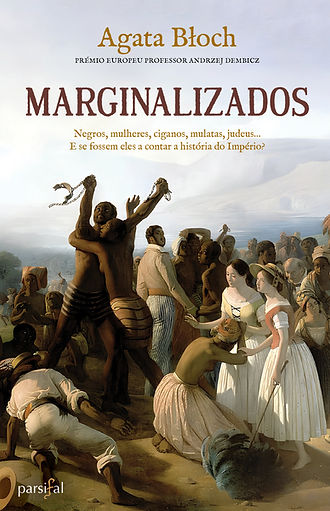Tadeusz Manteuffel
Institute of History
Polish Academy of Sciences
Warsaw/Poland

.jpg)
[PT] “Marginalizados”
Agata Błoch
Que grupos participaram na construção e consolidação do império colonial português sem ver a sua ação devidamente reconhecida? A resposta vai além da ação da Coroa e dos colonizadores: os grupos marginalizados. Esta obra dá voz aos indígenas africanos e americanos cujas histórias, aspirações e resistências eram parte ativa do processo de desenvolvimento do Atlântico português e desmistifica a ideia de que esses eram grupos passivos, revelando como, mesmo à margem, traçaram estratégias, negociaram e influenciaram o centro de poder em Lisboa. As suas lutas, fugas, manobras diplomáticas ou esperanças traduzem um império menos consolidado e mais dinâmico nas suas redes, constantemente moldadas por quem estava na periferia dos centros de decisão.
Lisboa: Edições Parsifal, 2025.
ISBN: 9789893576595
240 pages

[PT] “Memórias digitais”
Demival Vasques Filho, Agata Błoch, Juciene Ricarte Cardoso, João Carlos Nara Júnior
"Memórias Digitais" serves as an invitation to journey into the future of historical research, highlighting the growing synergy between humanities and digital technologies in creating fresh narratives of the past. This book explores how data processing and digital humanities are reshaping our approach to history, breaking through traditional boundaries and expanding scholarly horizons with both a critical and practical perspective on this transformation.
São Paulo: EditoraHN, 2024.

Paintng: Mariola Landowska
[PL] “The Free and the Enslaved. Voices of the Subalterns in the History of Portuguese Empire”
Agata Błoch
"The Free and the Enslaved. Voices of the Subalterns in the History of Portuguese Empire" is the story of ordinary and extraordinary people living on the outskirts of the Portuguese colonial empire. It tells the story of those who once inhabited present-day Brazil, Angola, Guinea-Bissau, and the Atlantic archipelagos of Cape Verde and São Tomé. Among them were not only indigenous peoples but also Jews, Jewish converts or Muslims fleeing religious persecution, and Gypsies, witches, and criminals sentenced by the Inquisition and civil courts. Once free, once enslaved. But their subalternity varied when we consider intersecting elements such as gender, assimilation, relationship to their master, and their place in the network structure. Thus, it is worth bringing out these voices and looking more closely at which social groups actively and consciously participated in making the Portuguese colonial empire and which ones disappeared forever from history. Will the reconstruction of history from the perspective of those most marginalized help to deconstruct it?
Monografie Fundacji na rzecz Nauki Polskiej. Poznań: Wydawnictwo Uniwersytetu Mikołaja Kopernika, 2022.
ISBN: 9788323147602
472 pages

Paintng: Mariola Landowska
[PT] “Livres e Escravizados. As Vozes dos Subalternos na História do Império Colonial Português ”
Agata Błoch
"Livres e Escravizados. As vozes dos subalternos na história do império colonial português" é uma história das pessoas que viviam nas periferias do império português. Conta a trajetória daqueles que habitavam o Brasil, Angola, Guiné-Bissau e os arquipélagos atlânticos de Cabo Verde e de São Tomé e Príncipe. Entre eles estavam não apenas os povos indígenas, mas também judeus, cristãos-novos ou muçulmanos que fugiam da perseguição religiosa, bem como os ciganos, bruxas e criminosos condenados pela Inquisição e pelos tribunais civis. Uma vez livres, outra vez escravizados. No entanto, a sua subalternidade variava quando consideramos a intersecção de tais elementos como gênero, assimilação, relação com seu mestre e seu lugar na estrutura da rede. Portanto, é importante resgatar estas vozes e refletir quais grupos participaram conscientemente na construção do império colonial português e quais deles desapareceram para sempre das cartas da história. Será que a reconstrução da história a partir da perspectiva dos mais marginalizados ajudará a desconstruí-la?
Biblioteka Iberyjska: Warszawa, 2022.
ISBN: 978-83-66901-47-6
468 pages

Paintng: Mariola Landowska
[PT] "Cape Verde - the paradise of the Portuguese colonial empire"
Agata Błoch
"Cape Verde - the paradise of the Portuguese colonial empire" tells the story of a small archipelago located in the Atlantic Ocean at the beginning of the Portuguese overseas expansion. In the 16th century, these islands became the center of the circulation of people, products, different species of plants and animals, knowledge, and ideas throughout the Portuguese colonial empire. At the same time it was a field for cultural and social experimentation and a strategic center at the crossroads of the most important maritime routes. In this archipelago, everything that left Africa and ended up in America or Asia was undergoing a process of adaptation. Exotic plants and animals from different continents were bred and then re-exported. In the port of Ribeira Grande, which was the capital of the Christian mission in Africa, slaves were baptized and taught the Portuguese language. A mixed society emerged, which was forced to learn everything from scratch. Surprisingly quickly, the inhabitants overcame their limits, making the islands the meeting point of four continents: Europe, America, Africa, and Asia. Cape Verde was a place of new opportunities, mystical ideas, dreams, and Western fears, remaining for many a paradise of the colonial Atlantic. But was it a paradise for everyone?
Porto Alegre, RS: Editora Fi, 2019.
ISBN: 978-85-5696-514-1
184 pages